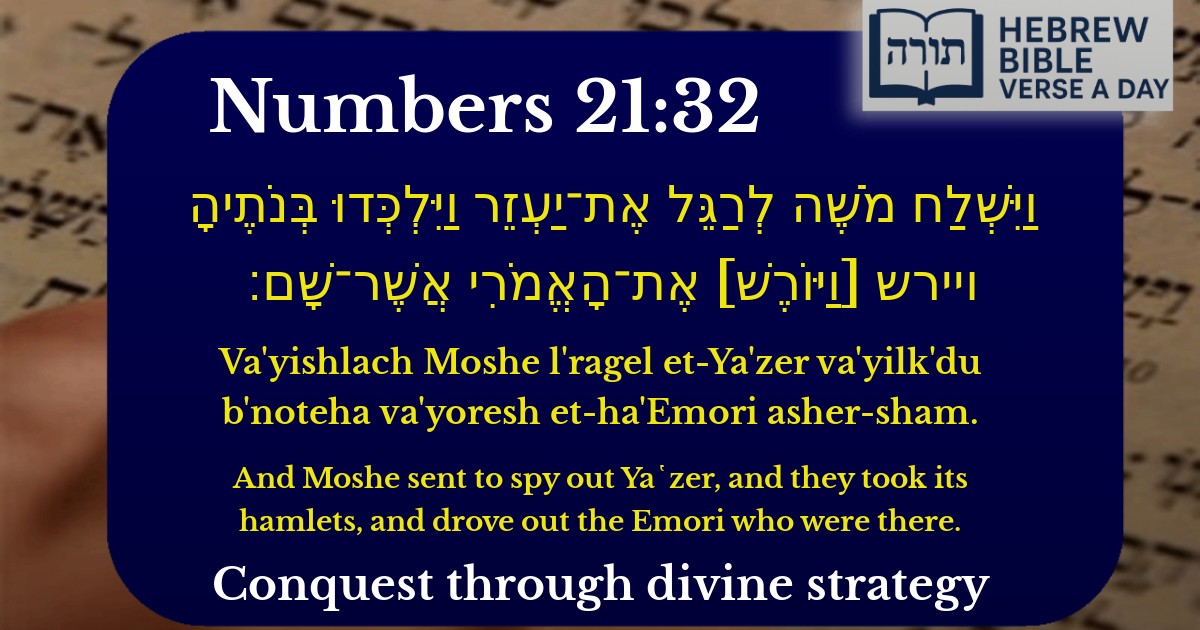Join Our Newsletter To Be Informed When New Videos Are Posted
Join the thousands of fellow Studends who rely on our videos to learn how to read the bible in Hebrew for free!
Hebrew Text
וַיִּשְׁלַח מֹשֶׁה לְרַגֵּל אֶת־יַעְזֵר וַיִּלְכְּדוּ בְּנֹתֶיהָ ויירש [וַיּוֹרֶשׁ] אֶת־הָאֱמֹרִי אֲשֶׁר־שָׁם׃
English Translation
And Moshe sent to spy out Ya῾zer, and they took its hamlets, and drove out the Emori who were there.
Transliteration
Va'yishlach Moshe l'ragel et-Ya'zer va'yilk'du b'noteha va'yoresh et-ha'Emori asher-sham.
Hebrew Leining Text
וַיִּשְׁלַ֤ח מֹשֶׁה֙ לְרַגֵּ֣ל אֶת־יַעְזֵ֔ר וַֽיִּלְכְּד֖וּ בְּנֹתֶ֑יהָ <span class="mam-kq"><span class="mam-kq-k">(ויירש)</span> <span class="mam-kq-q">[וַיּ֖וֹרֶשׁ]</span></span> אֶת־הָאֱמֹרִ֥י אֲשֶׁר־שָֽׁם׃
וַיִּשְׁלַ֤ח מֹשֶׁה֙ לְרַגֵּ֣ל אֶת־יַעְזֵ֔ר וַֽיִּלְכְּד֖וּ בְּנֹתֶ֑יהָ (ויירש) [וַיּ֖וֹרֶשׁ] אֶת־הָאֱמֹרִ֥י אֲשֶׁר־שָֽׁם׃
🎵 Listen to leining
Parasha Commentary
📚 Talmud Citations
This verse is not quoted in the Talmud.


Context in the Torah
The verse (Bamidbar 21:32) describes Moshe sending spies to scout Ya῾zer before capturing its settlements and driving out the Emori. This event occurs during Bnei Yisrael's travels in the wilderness, following their victory over Sichon, king of the Emori (Bamidbar 21:21-31). The conquest of Ya῾zer was part of securing territory east of the Jordan River before entering Eretz Yisrael.
Rashi's Commentary
Rashi (Bamidbar 21:32) explains that Moshe sent spies to Ya῾zer to assess the land before conquest, similar to the earlier mission in Yehoshua 2:1. He notes that the phrase "וַיִּלְכְּדוּ בְּנֹתֶיהָ" ("they took its hamlets") refers to the smaller towns surrounding Ya῾zer, which were captured first before the main city. This strategy mirrors the military approach used against Sichon's territory.
Rambam's Perspective on Warfare
Rambam (Hilchot Melachim 6:7) discusses the laws of permissible warfare, emphasizing that Bnei Yisrael were commanded to first offer peace before engaging in battle with the seven Canaanite nations (including the Emori). However, since Sichon had already initiated war (Bamidbar 21:23), this preemptive conquest was justified as self-defense and part of Hashem's promise to Avraham (Bereishit 15:18-21).
Midrashic Insights
Grammatical Note
The word "ויירש" (variant spelling of "וַיּוֹרֶשׁ") means "dispossessed" or "drove out," indicating a complete removal of the Emori. Ibn Ezra (Bamidbar 21:32) clarifies that this term implies both military victory and permanent settlement, fulfilling the promise of inheritance to the tribes of Reuven and Gad (Bamidbar 32:33).